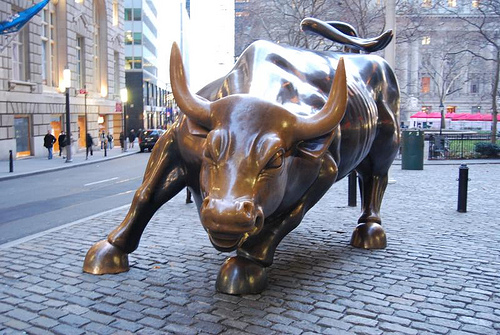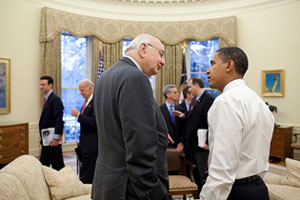President Obama looks ready to fight to ensure the survival of his plan to ban risky trading within the same walls as taxpayer-backed US banks, according to draft language from the administration obtained by Reuters today. Obama’s proposal would also place limits on the same kinds of trading at other big non-bank institutions, like Goldman Sachs. This new proposal, which will reportedly be sent to lawmakers today, reinforces a tough stance the president took back in January when, standing alongside former Federal Reserve chair Paul Volcker, for whom the idea is named, he called for new safeguards preventing federally-insured banks that take deposits from essentially gambling in venutres like hedge funds and private equity funds.
The proposal for non-banks would involve a cap on their risky trading levels and subjecting them to more enhanced regulation—the latter a proposal sure to irk the financial-services community. According to Reuters, the draft says, “These proposals are part of a comprehensive package of reforms to create a safer, more resilient financial system.”
It’s unclear right now how much of the Volcker proposals will make it into draft legislation now being hammered out in the Senate banking committee, led by Sen. Chris Dodd (D-Conn.), the committee’s chairman. Earlier this year, Dodd had lightly criticized the Obama administration for rolling out the proprietary-trading ban, saying the president’s proposal “seemed to many to be transparently political.” The banking committee is expected to release its financial-reform framework as early as this week. The Volcker Rule has also been downplayed by experts, like former IMF chief economist Simon Johnson, who say a firewall between proprietary trading and more boring banking activities wouldn’t get at the root of the problem:
For one thing, proprietary trading is but a small part of what these banks do. For most of the major banks, such activity accounts for less than 5 percent of total revenue—even at Goldman Sachs, which is, in some senses, the largest hedge fund in the world (backed by the US government through its access to the Fed’s discount window), proprietary trading accounts for only around 10 percent of total revenue on average. Even if we could strip this activity from the banks, it would reduce their size only slightly—and the too-big-to-fail banks would find ways to take similar-sized risks because their upside during a boom would still be big, and their downside in a bust would dramatically damage the economy, thereby forcing the government into some sort of rescue.
I’d recommend reading more of Johnson’s take on the Volcker plans here. And hearing what Johnson has to say, Obama’s continued backing for Volcker’s idea looks even more political. We’ll have to wait and see whether the Senate banking committee takes a cue from Obama or makes up its own mind on the issue.

















